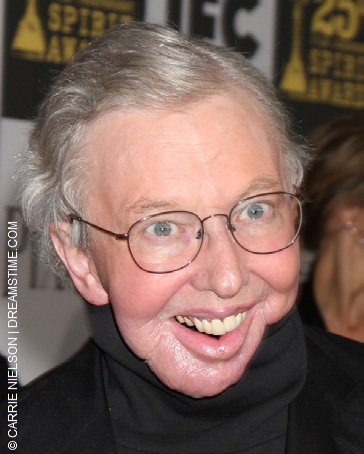Roger Ebert (1942 – 2013)
 Roger Ebert was born on June 18, 1942, in Urbana, Illinois. He was the only child of Annabel (a bookkeeper) and Walter Ebert (an electrician), who raised their son as a Roman Catholic.
Roger Ebert was born on June 18, 1942, in Urbana, Illinois. He was the only child of Annabel (a bookkeeper) and Walter Ebert (an electrician), who raised their son as a Roman Catholic.
As a teenager he was the editor of his high school paper and wrote for science fiction fanzines. In 1964 he graduated from the University of Illinois at Urbana-Champagne, where he wrote for the Daily Illini. In 1966, while pursuing a PhD in English at the University of Chicago, Ebert was hired as a reporter for the Chicago Sun-Times and became its film critic a year later. He would live in Chicago and write for the Sun-Times for the rest of his life.
Ebert was known to produce somewhere between 200 and 300 film reviews a year, which were syndicated in hundreds of newspapers, both in the United States and abroad. He was the first film critic to receive the Pulitzer Prize (1975) and went on to achieve small-screen fame as the co-host, along with film critic Gene Siskel, of the wildly popular At the Movies TV show featuring their signature “thumbs-up, thumbs-down” rating system.
In 2002 Ebert was diagnosed with papillary thyroid cancer, the treatment of which required multiple surgeries and resulted in him losing the ability to talk, eat, or drink. Ebert continued to review films, but as he embraced social media and became a prolific blogger, his persona as caustic critic expanded to that of fierce progressive and thoughtful champion for social justice.
Ebert was also a strong proponent of churchstate separation, as voiced in an August 18, 2012, column titled, “Don’t Tear Down that Wall!” in which he criticized efforts to teach creationism in public schools and legislative action to control individuals’ reproductive choices.
Commenting on the Ninth Circuit U.S. Court of Appeals 2003 finding that it was unconstitutional to require public school students to recite the Pledge of Allegiance because of the words “under God,” Ebert made the distinction between two kinds of prayer, vertical and horizontal, the latter of which he strongly decried. (Incidentally, the column, “Public Prayer Fanatics Borrow Page from Enemy’s Script,” was reprinted in the May/June 2003 Humanist.) “To choose an example from football,” Ebert wrote, “when my team needs a field goal to win and I think, ‘Please, dear God, let them make it!’—that is vertical prayer. When, before the game, a group of fans joins hands and ‘voluntarily’ recites the Lord’s Prayer—that is horizontal prayer. It serves one of two purposes: to encourage me to join them, or to make me feel excluded.”
In another Chicago-Sun column, written in 2009 and titled, “New Agers and Creationists Should Not Be President,” Ebert humorously lamented that many progressives, while wisely shunning creationism, were perfectly comfortable espousing all manner of supernatural or pseudoscientific ideas. “They were raised to avoid religion and politics at dinner parties with strangers. Yet they assure everyone they are ‘a typical Gemini,’ were royalty in a previous lifetime, have a personal spirit guide, and have been told they will develop a serious disease but will recover from it. I rarely hear anyone share that they were a toilet cleaner in a previous lifetime and have a year to live at the most.”
Roger Ebert died on April 4, 2013, after a long battle with cancer. In a 2009 blog entry titled, “Go Gently into That Good Night,” Ebert wrote of death: “I was perfectly content before I was born, and I think of death as the same state. What I am grateful for is the gift of intelligence, and for life, love, wonder, and laughter. … I believe that if, at the end of it all, according to our abilities, we have done something to make others a little happier, and something to make ourselves a little happier, that is about the best we can do.”![]()
